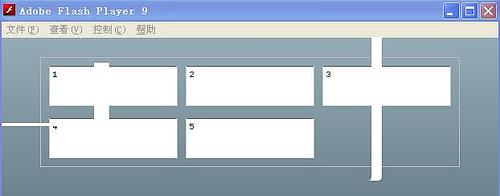Form 表单布局
Form容器是Flex 表单中处于最外层的容器,负责控制表单的大小,以及布局,通常表单中都是垂直布局,并且靠左对齐的。这个容器可以包含FormHeading以及FormItem。举个简单的例子。
|
<!-- containerslayoutsFormComplete.mxml --> <mx:Application xmlns:mx="http://www.adobe.com/2006/mxml"> <mx:Script> <![CDATA[ private function submitForm():void { // Handle the form submission. } ]]> </mx:Script> <mx:Form id="myForm" width="400"> <mx:FormHeading label="Billing Information"/> <mx:FormItem label="First Name"> <mx:TextInput id="fname" width="100%"/> </mx:FormItem> <mx:FormItem label="Last Name"> <mx:TextInput id="lname" width="100%"/> </mx:FormItem> <mx:FormItem label="Address"> <mx:TextInput id="addr1" width="100%"/> <mx:TextInput id="addr2" width="100%"/> </mx:FormItem> <mx:FormItem label="City / State" direction="vertical"> <mx:TextInput id="city"/> <mx:ComboBox id="st" width="75"> <mx:ArrayCollection> <mx:String>MA</mx:String> <mx:String>NH</mx:String> <mx:String>RI</mx:String> </mx:ArrayCollection> </mx:ComboBox> </mx:FormItem> <mx:FormItem label="ZIP Code"> <mx:TextInput id="zip" width="100"/> </mx:FormItem> <mx:FormItem label="Country"> <mx:ComboBox id="cntry"> <mx:ArrayCollection> <mx:String>USA</mx:String> <mx:String>UAE</mx:String> <mx:String>UAW</mx:String> </mx:ArrayCollection> </mx:ComboBox> </mx:FormItem> <mx:FormItem> <mx:HRule width="200" height="1"/> <mx:Button label="Submit Form" click="submitForm();"/> </mx:FormItem> </mx:Form> </mx:Application> |
效果图: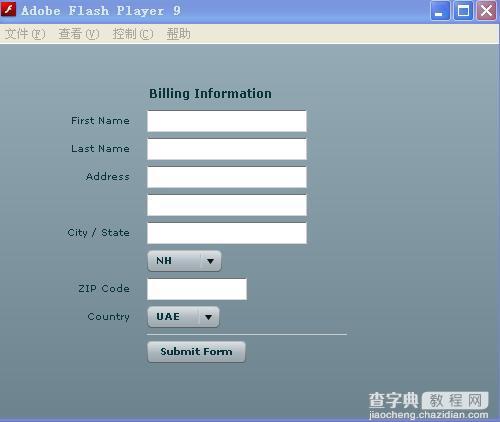
Grid布局
Grid通过网格的方法来放置组件,其实是把组件作为横纵方向的一个单元来实现的。<mx:Grd>来创建一个Grid容器。<mx:GridRow>创建每一行,但是这个标记必须是<mx:Grd>子标记。同样利用<mx:GridItem>可以创建每一行中的单元组件,而且这个标记也必须为<mx:GridRow>子标记。
|
<?xml version="1.0"?> <!-- containerslayoutsGrid5Button.mxml --> <mx:Application xmlns:mx="http://www.adobe.com/2006/mxml"> <mx:Grid id="myGrid"> <!-- Define Row 1. --> <mx:GridRow id="row1"> <!-- Define the first cell of Row 1. --> <mx:GridItem> <mx:Button label="Button 1"/> </mx:GridItem> <mx:GridItem> <mx:Button label="2"/> </mx:GridItem> <mx:GridItem> <mx:Button label="Button 3"/> </mx:GridItem> <mx:GridItem> <mx:Button label="Button 3a"/> </mx:GridItem> <mx:GridItem> <mx:Button label="Button 3b"/> </mx:GridItem> </mx:GridRow> <!-- Define Row 2. --> <mx:GridRow id="row2"> <!-- Define a single cell to span three columns of Row 2. --> <mx:GridItem colSpan="3" horizontalAlign="center"> <mx:Button label="Long-Named Button 4"/> </mx:GridItem> </mx:GridRow> <!-- Define Row 3. --> <mx:GridRow id="row3"> <!-- Define an empty first cell of Row 3. --> <mx:GridItem/> <!-- Define a cell to span columns 2 and 3 of Row 3. --> <mx:GridItem colSpan="2" horizontalAlign="center"> <mx:Button label="Button 5"/> </mx:GridItem> </mx:GridRow> </mx:Grid> </mx:Application> |
如图: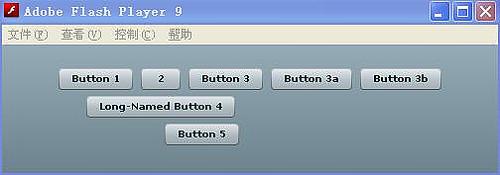
Panel 容器
这个就比较简单了。
Panel
具有Canvas HBox VBox
的所有功能,如果Panel的layout属性值为 absolute则Panel对子级元素的布局方式和Canvas一样当为 horizontal时则相当于 HBox 为vertical时则相当于VBox并且可以为 Panel指定标题.
|
<?xml version="1.0"?> <!-- containerslayoutsTileSizing.mxml --> <mx:Application xmlns:mx="http://www.adobe.com/2006/mxml"> <mx:Panel title="Panel layout" width="100%" height="100%"> <mx:Label name="Label1"/> <mx:Button label="button1"/> </mx:Panel> </mx:Application> |
效果如图: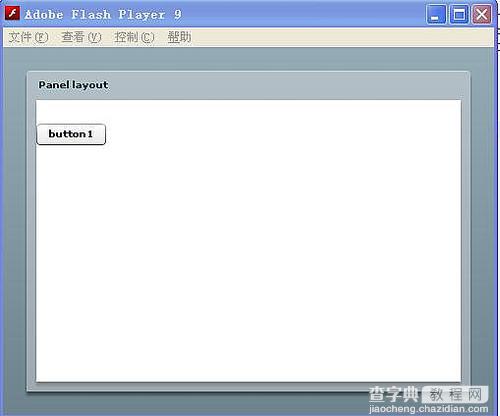
TitelWindow容器
TitleWindow继承自Panel,与Panel相比,它只多了一个对象,那就是关闭按钮,通过 TitleWindow close事件触发该按钮的单击事件它并不会自动将TitleWindow本身关闭,而是通过我们为该事件所写的代码决定。
|
<?xml version="1.0"?> <!-- containerslayoutsTileSizing.mxml --> <mx:Application xmlns:mx="http://www.adobe.com/2006/mxml"> <mx:Script> <![CDATA[ import mx.controls.Alert; private function closeEvent():void{ Alert.show("you click the close","close"); } ]]></mx:Script> <mx:TitleWindow title="Title" width="100%" height="100%" showCloseButton="true" close="closeEvent()"> <mx:Button label="Button"/> </mx:TitleWindow> </mx:Application> |
效果如图:
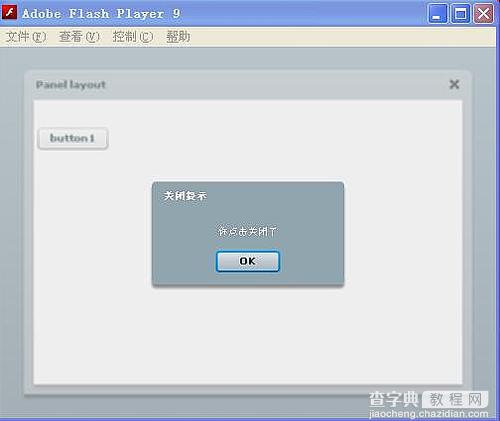
Title layout 容器
所有的Titel容器中的单元组件都是具有相同大小尺寸的。这与Grid容器明显不一样了。这样就会出现这种情况,比如拟定每一行放置3个组件,你刚好有7个组件,那么就会分成3行放置,这样的话,最后一行就只有组件了。Title容器就具有这个特点。
|
<?xml version="1.0"?> <!-- containerslayoutsTileSimple.mxml --> <mx:Application xmlns:mx="http://www.adobe.com/2006/mxml"> <mx:Tile id="myFlow" direction="horizontal" borderStyle="solid" paddingTop="10" paddingBottom="10" paddingRight="10" paddingLeft="10" verticalGap="15" horizontalGap="10"> <mx:TextInput id="text1" text="1" height="50" width="75"/> <mx:TextInput id="text2" text="2" height="50" width="100"/> <mx:TextInput id="text3" text="3" height="50" width="75"/> <mx:TextInput id="text4" text="4" height="50" width="75"/> <mx:TextInput id="text5" text="5" height="50" width="75"/> </mx:Tile> </mx:Application> |
效果如图:
